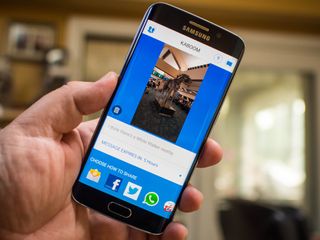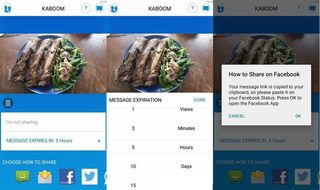Kaboom is the latest effort to create self-destructing online messages

As a general rule, it's pretty widely understood that if you want something to stay private you keep it off the Internet. There's never going to be a 100% guarantee that a private message will stay private, because at some point in the process a human being is involved and those folks can't be universally trusted to do the right thing. That doesn't stop companies from giving it a try, and with each revision of this idea we get closer and closer to something that might work in most situations. The latest effort is an app called Kaboom, and if nothing else it's got a nice UI for deleting your message from the Internet when you decide it needs to go.
Essentially, Kaboom is a hosted message service with baked in social sharing and a tool that lets you decide how long a message or photo exists on the Internet before it is removed from the Kaboom servers. You can send a private message with a photo attached and have it disappear in five minutes, or you can post something to Facebook and have the information hidden in the link go away in 24 hours. You get a notification that lets you know when someone has clicked and viewed the message, as well as a button to destroy the message outside of the pre-determined window you initially assigned.

Kaboom also includes the ability to send messages to other Kaboom users, along with a helpful sign-up link for those who aren't already using the service. Since the app can't disable screenshots, your name and phone number are part of the registration process, and photos you take in the Kaboom app still show up in Google Photos, it's not entirely clear why you would do that unless all of your friends were already using this as a messaging service. The links generated by the service are the same everywhere, so it's essentially the same number of steps.
Kaboom is a great tool for streamlining the kill process with messages and photos you don't want to stick around for a while, and as long as you use it in precisely that way and not try to rely on it as an actual privacy tool it can be a useful app in your drawer. It's also free, and you can check it out for yourself starting today.
Be an expert in 5 minutes
Get the latest news from Android Central, your trusted companion in the world of Android

